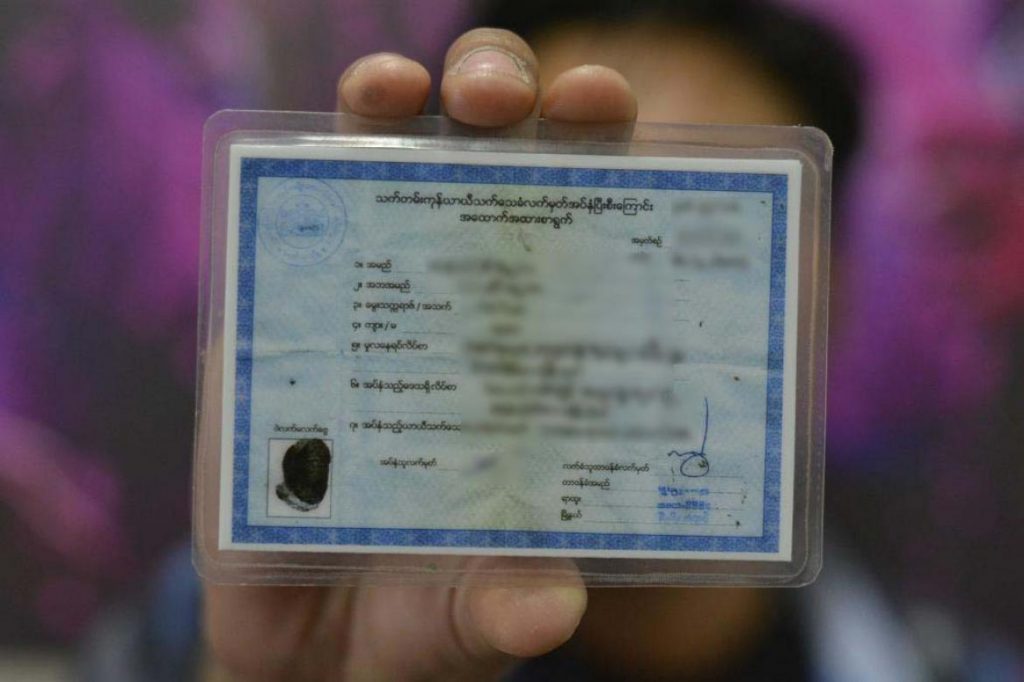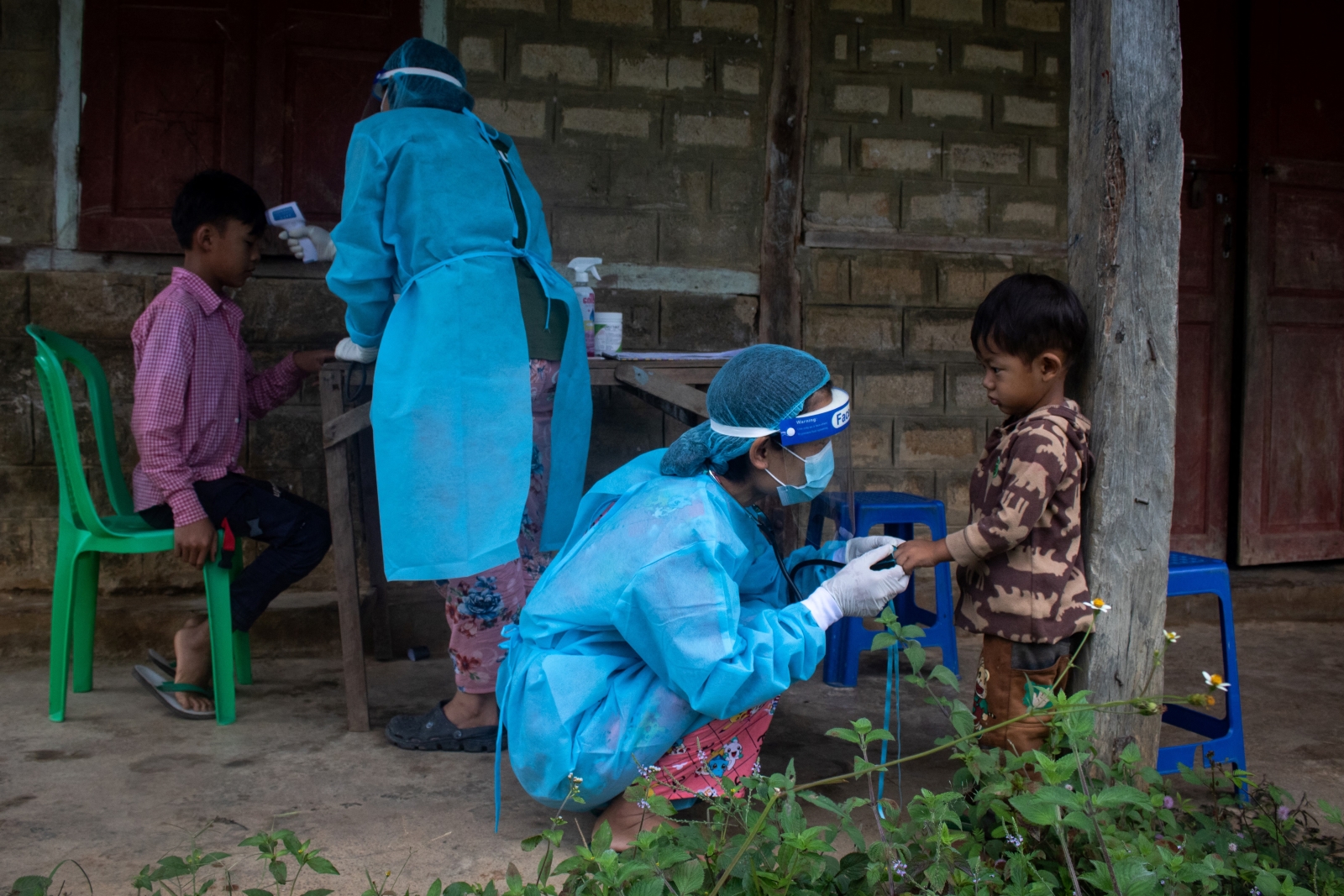By GEOFFREY GODDARD | FRONTIER
YANGON — Senior United Nations personnel and some international humanitarian organisations have supported Myanmar government policies against Rohingya Muslims by backing their acceptance of National Verification Cards, human rights advocacy group Fortify Rights says in a new report.
The accusation is made in “Tools of Genocide: National Verification Cards and the denial of citizenship of Rohingya Muslims in Myanmar”, a 102-page report released in Bangkok on September 3.
The release of the report comes as the International Criminal Court is considering whether to seek a full investigation into allegations that Rohingya Muslims were the victims of crimes against humanity during a “clearance operation” by the Tatmadaw in northern Rakhine State that began in August 2017.
The operation, launched after coordinated attacks on security posts by the militant Arakan Rohingya Salvation Army, was accompanied by widespread reports of killings, mass rape, torture and the torching of villages and sent about 740,000 people fleeing to safety to neighbouring Bangladesh.
Support more independent journalism like this. Sign up to be a Frontier member.
The Fortify Rights report says senior UN officials and diplomats have privately and publicly supported the NVC process, implemented by the National League for Democracy government after it took office in 2016, and its earlier iterations.
It says the support was given despite the NVC process violating the Rohingya’s right to nationality and customary international law, as well as treaties to which Myanmar is a party, including the International Covenant on Economic, Social, and Cultural Rights, the Convention of the Rights of the Child, the Convention on the Elimination of All Forms of Discrimination against Women, “and may have contributed to the commission of genocide and crimes against humanity”.
It says that a statement issued by UN special envoy to Myanmar, Ms Christine Schraner Burgener, on January 29, 2019 at the end of a country visit, failed to use the term “Rohingya” and “encouraged the internally displaced people she met to consider applying for [NVC] registration”.
The statement also parroted government rhetoric that NVCs are “a first step to citizenship”, Fortify Rights says, adding that Burgener’s predecessor as special envoy, Mr Vijay Nambiar, “took a similar position”.
UN officials in Myanmar, Geneva and New York, had for several years effectively endorsed the NVC process, “suggesting that the government was undertaking it in good faith or that it was a pragmatic option in a difficult context”.
Fortify Rights acknowledges that the UN response to the citizenship verification process, including NVCs, has been mixed.
Some senior UN officials, including the UN Office of the High Commissioner for Human Rights, the experts appointed by the UN Human Rights Council to the Independent International Fact-Finding Mission on Myanmar (FFM), and UN special rapporteurs on human rights in Myanmar, have been outspoken about problems with the NVC process and related human rights violations, it says.
It quoted the FFM as describing the NVC process as “cumbersome, protracted and increasingly coercive” in its exhaustive September 2018 report which concluded that there was “sufficient information to warrant the investigation and prosecution of senior officials in the Tatmadaw chain of command”, for the crime of genocide and crimes against humanity in Rakhine.
Fortify Rights also says that at least five humanitarian aid organisations that operated in northern Rakhine have coerced Rohingya to accept NVCs since 2016, and some prevented Rohingya employees from identifying as Rohingya.
The report cites several Rohingya working for such organisations as saying they were pressured to accept NVCs, in some cases by being promised greater job security if they acquiesced to the demands, such as being offered yearly instead of monthly contracts.
The report acknowledges that discriminatory government policies and practices against Rohingya, including the NVC process, have posed particular challenges for international aid groups operating in northern Rakhine. The policies include requiring Rohingya aid workers who need to travel as part of their job to hold an NVC.
Fortify Rights was also told by Rohingya who had worked for international aid groups in Rakhine that their organisations did not allow the internal use of the term “Rohingya”.
One Rohingya aid worker said, “Talking about being a Rohingya was not practiced. We did not feel comfortable to call each other Rohingya”.
Fortify Rights says that measures and legislation implemented by successive governments in Myanmar to erase the identity and rights of Rohingya Muslims had created “an enabling environment for genocide”.
It says that the authorities continue to pressure Rohingya to accept NVCs by imposing added restrictions on movement, “enforced through ubiquitous military and police checkpoints. Security forces do not always grant Rohingya who hold NVCs with permission to pass, and Rohingya often encounter violence, threats, extortion, and other abuses at the checkpoints.”
Fortify Rights says it documented cases of Rohingya refusing to accept NVCs en masse in the weeks and months before August 2017, when they came under increasing pressure to accept the documents. “Rohingya told Fortify Rights that they believe the Myanmar Army attacked them, in part, as a result,” the report says.
Rohingya interviewed for the report told of being assaulted or threatened with violence by the authorities to force them to accept NVCs, which identify them as “Bengali”.
A Rohingya farmer, 62, told of being beaten all over his body and warned, “If you don’t accept the NVC, we will kill you”.
Another man, 61, said four of his seven family members were forced by soldiers at gunpoint to accept NVCs.
“The NVC is a tool of genocide,” a Rohingya refugee in Bangladesh told Fortify Rights in English, later adding, “We want our citizenship restored first, and there should be equality, safety, and security in our motherland.”
The report notes that the UN Office on Genocide Prevention warns of indicators that “provide an environment conducive to the commission of atrocity crimes”, including “increased politicization of identity” and discriminatory “measures or legislation” targeting specific groups. “In addition to certain prohibited acts, such as killing members of a group, genocidal States often use legal and administrative tools to facilitate the destruction of a targeted group “in whole or in part”.
Fortify Rights said the report is based on interviews with 628 people, including 304 women, conducted in Rakhine, refugee camps in Cox’s Bazar, Bangladesh, and in the Malaysian capital, Kuala Lumpur, home of many members of the Rohingya diaspora.







